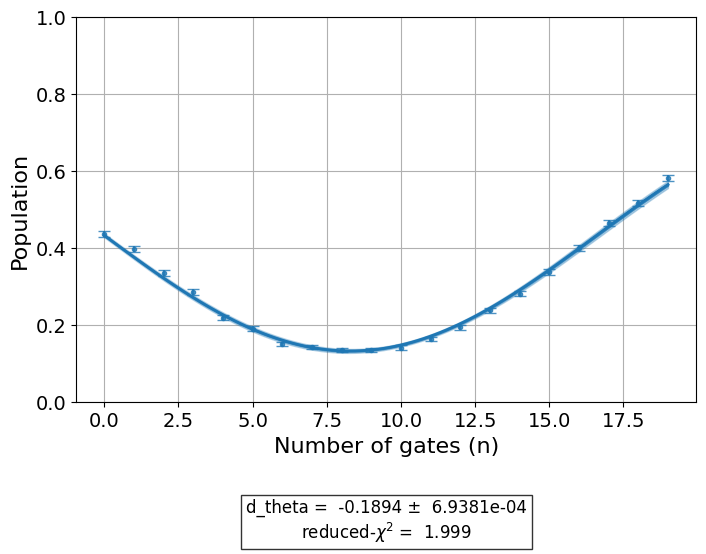FineSXDrag¶
- class FineSXDrag(physical_qubits, backend=None)[source]¶
Class to fine characterize the DRAG parameter of an \(SX\) gate.
Analysis class reference
Experiment options
These options can be set by the
set_experiment_options()method.- Options
Defined in the class
FineSXDrag:gate (Gate)
Default value: Instance ofSXGateFineSXDrag calibrates an SXGate.
Defined in the class
FineDrag:repetitions (List[int])
Default value: [0,1,2,3,4, …]A list of the number of times that Rp - Rm gate sequence is repeated.
Defined in the class
BaseExperiment:max_circuits (Optional[int])
Default value:NoneThe maximum number of circuits per job when running an experiment on a backend.
Example
import numpy as np from qiskit_experiments.library.characterization import FineSXDrag exp = FineSXDrag(physical_qubits=(0,), backend=backend) exp_data = exp.run().block_for_results() display(exp_data.figure(0)) exp_data.analysis_results(dataframe=True)

name experiment components value quality backend run_time chisq a2eed6c0 d_theta FineSXDrag [Q0] 0.0098+/-0.0012 good aer_simulator None 0.650288 See also
Initialization
Initialize the experiment.
Attributes
- analysis¶
Return the analysis instance for the experiment
- backend¶
Return the backend for the experiment
- experiment_options¶
Return the options for the experiment.
- experiment_type¶
Return experiment type.
- num_qubits¶
Return the number of qubits for the experiment.
- physical_qubits¶
Return the device qubits for the experiment.
Methods
- circuits()¶
Create the circuits for the fine DRAG calibration experiment.
- Returns:
A list of circuits with a variable number of gates.
- Return type:
List[QuantumCircuit]
- config()¶
Return the config dataclass for this experiment
- Return type:
- copy()¶
Return a copy of the experiment
- Return type:
- classmethod from_config(config)¶
Initialize an experiment from experiment config
- Return type:
- job_info(backend=None)¶
Get information about job distribution for the experiment on a specific backend.
- Parameters:
backend (Backend) – Optional, the backend for which to get job distribution information. If not specified, the experiment must already have a set backend.
- Returns:
A dictionary containing information about job distribution.
”Total number of circuits in the experiment”: Total number of circuits in the experiment.
”Maximum number of circuits per job”: Maximum number of circuits in one job based on backend and experiment settings.
”Total number of jobs”: Number of jobs needed to run this experiment on the currently set backend.
- Return type:
dict
- Raises:
QiskitError – if backend is not specified.
- run(backend=None, sampler=None, analysis='default', timeout=None, backend_run=None, **run_options)¶
Run an experiment and perform analysis.
- Parameters:
backend (Backend | None) – Optional, the backend to run on. Will override existing backend settings.
sampler (BaseSamplerV2 | None) – Optional, the sampler to run the experiment on. If None then a sampler will be invoked from previously set backend
analysis (BaseAnalysis | None) – Optional, a custom analysis instance to use for performing analysis. If None analysis will not be run. If
"default"the experimentsanalysis()instance will be used if it contains one.timeout (float | None) – Time to wait for experiment jobs to finish running before cancelling.
backend_run (bool | None) – Use backend run (temp option for testing)
run_options – backend runtime options used for circuit execution.
- Returns:
The experiment data object.
- Raises:
QiskitError – If experiment is run with an incompatible existing ExperimentData container.
- Return type:
- set_experiment_options(**fields)¶
Set the experiment options.
- Parameters:
fields – The fields to update the options
- Raises:
AttributeError – If the field passed in is not a supported options
- set_run_options(**fields)¶
Set options values for the experiment
run()method.- Parameters:
fields – The fields to update the options
See also
The Setting options for your experiment guide for code example.
- set_transpile_options(**fields)¶
Set the transpiler options for
run()method.- Parameters:
fields – The fields to update the options
- Raises:
QiskitError – If initial_layout is one of the fields.
See also
The Setting options for your experiment guide for code example.